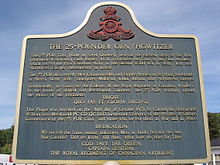
"Ubique" is a poem by Rudyard Kipling about the Boer War, published in The Five Nations in 1903. [1] T. S. Eliot included the poem in his 1941 collection A Choice of Kipling's Verse .

"Ubique" is a poem by Rudyard Kipling about the Boer War, published in The Five Nations in 1903. [1] T. S. Eliot included the poem in his 1941 collection A Choice of Kipling's Verse .
Ubique ("everywhere" in Latin) is the motto of the Royal Artillery [2] and the Royal Engineers. [3] It was given to them by King William IV in 1832 and in 1833 it was further granted as a battle honour to the Royal Artillery in place of all former and later battle honours they could receive.

Joseph Rudyard Kipling was an English novelist, short-story writer, poet, and journalist. He was born in British India, which inspired much of his work.
This is a bibliography of works by Rudyard Kipling, including books, short stories, poems, and collections of his works.

"If—" is a poem by English writer and poet Rudyard Kipling (1865–1936), written circa 1895 as a tribute to Leander Starr Jameson. It is a literary example of Victorian-era stoicism. The poem, first published in Rewards and Fairies (1910) following the story "Brother Square-Toes", is written in the form of paternal advice to the poet's son, John.

The Barrack-Room Ballads are a series of songs and poems by Rudyard Kipling, dealing with the late-Victorian British Army and mostly written in a vernacular dialect. The series contains some of Kipling's best-known works, including the poems "Gunga Din", "Tommy", "Mandalay", and "Danny Deever", helping consolidate his early fame as a poet.

"Recessional" is a poem by Rudyard Kipling. It was composed for Diamond Jubilee of Queen Victoria, in 1897.

"Mandalay" is a poem by Rudyard Kipling, written and published in 1890, and first collected in Barrack-Room Ballads, and Other Verses in 1892. The poem is set in colonial Burma, then part of British India. The protagonist is a Cockney working-class soldier, back in grey restrictive London, recalling the time he felt free and had a Burmese girlfriend, now unattainably far away.

Ubique is Latin for "everywhere", and may refer to:
"My Boy Jack" is a 1916 poem by Rudyard Kipling. Kipling wrote it for Jack Cornwell, the 16 year old youngest recipient of the Victoria Cross who stayed by his post on board the light cruiser HMS Chester at the Battle of Jutland until he died. Kipling's son John was never referred to as "Jack". The poem echoes the grief of all parents who lost sons in the First World War. John Kipling was a 2nd Lt in the Irish Guards and disappeared in September 1915 during the Battle of Loos in the First World War. The poem was published as a prelude to a story in his book Sea Warfare written about the Battle of Jutland in 1916. The imagery and theme is maritime in nature and as such it is about a generic nautical Jack, though emotionally affected by the death of Kipling's son.

"The Bell Buoy" is a poem by Rudyard Kipling. It was first published with illustrations in Saturday Review, Christmas Supplement 1896 and then published in McClure's Magazine in February 1897 as "The Bell-Buoy", with illustrations by Oliver Herford. It was also included in the 1903 collection The Five Nations.
"Submarines" is a poem written by Rudyard Kipling (1865-1936), and set to music by the English composer Edward Elgar in 1917, as the third of a set of four war-related songs on nautical subjects for which he chose the title "The Fringes of the Fleet".

The Fringes of the Fleet is a booklet written in 1915 by Rudyard Kipling (1865–1936). The booklet contains essays and poems about nautical subjects in World War I.
The Definitive Edition of the verse of Rudyard Kipling (1865–1936) was published in 1940 in London by Hodder and Stoughton, Ltd and in Edinburgh by R. R. Clark. It is a one-volume collection and was printed on India paper.

"The King's Pilgrimage" is a poem and book about the journey made by King George V in May 1922 to visit the World War I cemeteries and memorials being constructed at the time in France and Belgium by the Imperial War Graves Commission. This journey was part of the wider pilgrimage movement that saw tens of thousands of bereaved relatives from the United Kingdom and the Empire visit the battlefields of the Great War in the years that followed the Armistice. The poem was written by the British author and poet Rudyard Kipling, while the text in the book is attributed to the Australian journalist and author Frank Fox. Aspects of the pilgrimage were also described by Kipling within the short story "The Debt" (1930).
"Tommy" is an 1890 poem by Rudyard Kipling, reprinted in his 1892 Barrack-Room Ballads. The poem addresses the ordinary British soldier of Kipling's time in a sympathetic manner. It is written from the point of view of such a soldier, and contrasts the treatment they receive from the general public during peace and during war.
"Boots" is a poem by English author and poet Rudyard Kipling (1865–1936). It was first published in 1903, in his collection The Five Nations.

The Five Nations, a collection of poems by English writer and poet Rudyard Kipling (1865–1936), was first published in late 1903, both in the United Kingdom and the U.S.A. Some of the poems were new; some had been published before, sometimes in different versions.
A Choice of Kipling's Verse, made by T. S. Eliot, with an essay on Rudyard Kipling is a book first published in December 1941. It is in two parts. The first part is an essay by American-born British poet T. S. Eliot (1888-1965), in which he discusses the nature and stature of British poet Rudyard Kipling (1865-1936). The second part consists of Eliot's selection from Kipling's poems.
"Dane-geld" is a poem by British writer Rudyard Kipling (1865-1936). It relates to the unwisdom of paying "Danegeld", or what is nowadays called blackmail and protection money. The most famous lines are "once you have paid him the Danegeld/ You never get rid of the Dane."
"McAndrew's Hymn" is a poem by English writer Rudyard Kipling (1865–1936). It was begun in 1893, and first published in December 1894 in Scribner's Magazine. It was collected in Kipling's The Seven Seas of 1896. Some editions title the poem "M'Andrew's Hymn".

The Royal Artillery Mounted Rifles were detachments of the British Army's Royal Artillery when deployed as mounted infantry. The units were first developed towards the end of the Second Boer War which was characterised by guerrilla warfare. There was little call for traditional units of field or horse artillery but high demand for mounted infantrymen to counter the highly mobile Boer commandos. By the end of the war around 2,000 artillerymen were acting in the mounted infantry role. A similar force was deployed to Ireland in the early 1920s to counter guerrilla tactics used by Irish republicans.